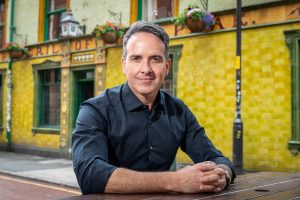Fall guitarist Brix on taking back control

Brix Smith-Start was a guitarist in the Fall and married to its founder Mark E Smith. Leaving the band marked a new phase in her remarkable life, as she reinvented herself as a fashionista, wrote a remarkable autobiography and, finally, returned to music. By Gary Ryan
TOURING Germany as guitarist in the Fall in 1987, Brix Smith-Start arrived in Hamburg to discover the venue had been overbooked.
“People couldn’t get in and there was a riot,” she remembers. “I looked at people lighting tyres on fire and rolling them down the street and thought: this is rock and roll.”
When Laura Elisse Salenger’s father disowned her in a neurotic fury aged 17, she changed her name to Brix – inspired by Guns of Brixton, her favourite Clash song – and has continued to reinvent herself throughout her life.
Those who remember her as adding pop sheen and glamour to John Peel’s favourite outsider’s band in the mid-1980s – or fronting forgotten bubblegum indie outfit the Adult Net – may have been surprised to see her turn up as sartorial expert on the mainstream Gok Wan’s Fashion Fix in 2008.
Now she’s written a riotous and candid autobiography, The Rise, The Fall, and The Rise – a book she claims “saved” her – but it’s about more than her tempestuous marriage to notoriously splenetic Fall frontman Mark E Smith, a long time resident of Prestwich north of Manchester.
“People imagined I would rip into Mark Smith and throw all the bones on the table,” said the 53 year old from her London home.
“But it’s more to do with other things than the Fall, although you do get a good insider’s view of the band.”
So yes, there’s stuff about her volatile partnership with Smith, whom she describes as the Mancunian Castro, and the inner-workings of the Fall, a group constantly in more turmoil and flux than a Corbyn shadow cabinet.
But The Rise also covers her troubled childhood in LA, her “borderline bulimia” and a brutal rape she kept secret for mlre than 30 years.
Smith-Start talks like she writes, peppering her conversation with LA therapy speak.
Wildly entertaining, she’s a combination of hyper self-aware and uncensored – like someone who has used up their allowance of damns to give. Her parents divorced when she was two. Her mother worked for CBS television, and periodically she would stay with her father – a paranoid and bullying Beverly Hills child psychiatrist who exemplifies the phrase “Physician, heal thyself”.
“There’s a theory that lots of psychiatrists are crazier than their patients,” laughed Smith-Start. “Whether that’s because they’re absorbing all the neurosis and it’s flooding their psyche or, in fact, they’re so crazy themselves that they’re trying to fix themselves by fixing others, who the hell knows?”
In hindsight, she feels his abusive behaviour partly lay in his undiagnosed multiple sclerosis.
“We had a very dysfunctional and f*****-up relationship. Eventually I realised I just wanted my father to love me. But I was not the cause of my father’s misery – he was. Once I realised I had nothing to do with the way he was towards me, I completely forgave myself and forgave him and I was free.”
One striking early moment in The Rise is when she decides to lose her virginity by looking up her favourite rock star – whom she declines to name – turning up at his door and propositioning him.
“People are like, ‘that’s a weird thing to do’, but it was empowering. I think it was brave – I wouldn’t be so bold now as to do it now.”
It was when her mother moved to Chicago – and newly reborn as Brix – that she discovered the Fall. Listening to their Slates EP, it made her world spin off its axis.
She literally bumped into Mark E Smith – six years her senior – after a gig in the city.
“I had found my soulmate,” she writes. In 1983, she swapped the Windy City for “grim” Prestwich, moving into his squalid flat, with its dirt-encrusted walls and overpowering odour of urine.
“It wasn’t at all what I expected,” she recalls. “I probably had some fantasy notion of ivy-covered cottages and cobbled streets. And it was like a Victorian industrial stump.”
Was she tempted to turn back? “No. Because I was following my joy and doing what I felt I was put on this earth to – being a singer-songwriter – and having an adventure. I was with the man I loved.”
Married in a registry office in Bury merely two months after her arrival, she joined the Fall as guitarist and co-writer during their most commercially-successful period and brought a creative shift to the band. You feel she opened the curtains slightly and let some sunlight into the Fall’s deliberately bleak world.
With 64 ex-members, the Fall retain a reputation as the most dysfunctional functioning group around. During the European referendum campaign, a photo emerged of a Vote Leave poster. Underneath, somebody had cheekily added “to get the same job security as a member of the Fall”.
“I think he [Smith] is a controlling person maybe because he feels his life is out of control,” Smith-Start said. “But if I was controlled by him, it’s because I allowed myself to be. When our relationship went wrong, he was difficult and probably undermining. And then it was up to me to walk away and not stand and take it.”
As their relationship imploded amid the Fall’s barely-marshalled chaos, they divorced in 1989 – following a torturous limbo period when she was still in the band and Smith was sleeping with his PA.
On the day he left her, Smith-Start’s mother told her: “This is the best thing that’s ever happened to you.” She said the aftermath was the most painful part to write.
“My mother could see I was suffering. After he left me, I became seriously depressed and had to go on anti-depressants. Not because he left me – that was just the trigger that started it. I had really bad eating disorders. I felt unwanted – that brought back issues with my father. My mother flew over and helped me. She took me to Al-Anon and paid for me to see a psychiatrist.”
Virtuoso violinist Nigel Kennedy – whom she describes as a “cross between Wolfgang Amadeus Mozart and Keith Moon” – was her second ill-fated tryst.
Although not as belligerent as Smith, he proved as controlling. It was while living in a garage she had rented from the parents of Susanna Hoffs – and waitressing in LA – when the Bangles member identified the root of her predilection for “crazy, genius men”.
“Susanna’s father is a psychiatrist as well, but he’s a good psychiatrist! He’s the good witch to my father’s bad witch,” said Smith-Start.
“She said: ‘Can’t you see? You’re repeating the same pattern – you’re looking for men in the same mould as your father because you craved his love.’ Once the pattern had been identified, I could make better choices.”
In 1995, Smith begged her to return to the Fall. She turned down a chance to join Courtney Love’s Hole for this second tour of duty.
She found him so engulfed by addiction (after shaking a disabled fan’s hand, he ended up with self-inflicted scabs after trying to bite out the “disease”) that she pleaded with the record label to intervene.
Following Amy Winehouse’s death in 2011, debate has raged about the level to which the music industry has a duty of care to artists.
She said: “It’s tricky because addicts have to hit rock bottom to find a better way. You can’t make anybody get help. However, when you see somebody suffering like that, you have to do what you can. It’s out of your control but you’ll hate yourself if you didn’t try. I don’t regret saying something – but it fell on deaf ears.”
Her second spell in the Fall culminated in her charging at her ex-spouse, wielding her guitar like an axe and screaming: “I will smash your head in like a pumpkin.”
By Gary Ryan. The Rise, The Fall, And The Rise by Brix Smith-Start is published by Faber. The full version of this feature was originally published in Big Issue North (bigissueinthenorth.com), available from vendors across the North West and Yorkshire and Humber (£2.50).








